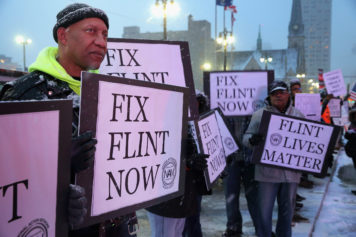
Courtesy NBCNews.
Michigan Attorney General Bill Schuette is suing two water engineering firms hired to assist in Flint’s ongoing water crisis.
The civil lawsuit, filed Wednesday in Genesee County Circuit Court, alleges “acts and omissions” by Veolia North America caused corrosion to the city’s lead pipes, which resulted in lead leaching into the water supply and “ultimately poisoning the residents themselves,” according to the Detroit Free Press.
Lockwood, Andrews & Newnam (LAN), and parent company Leo A. Daly Co., are named as co-defendants in the claim.
Schuette was joined by Special Assistant Attorney General Noah Hall and members of his special task force during a morning news conference at the University of Michigan-Flint, where he formally announced civil charges, including “professional negligence, fraud and public nuisance.”
In the lawsuit, state prosecutors said the City of Flint hired Veolia in February 2015 in response to mounting resident complaints and concerns over violations of the Safe Drinking Water Act.
But Veolia contends their contract with the city had no relation to the present lead problem and said their testing involved an analysis of residual products, “total trihalomethanes/TTHMs, discoloration, and taste-and-odor issues” caused by the city’s disinfectant process, mlive reports.
“Lead and copper testing were never included in the scope of work for Veolia,” Paul Whitmore, communications manager said, per mlive, in April. “The City of Flint was conducting tests for lead and copper through another company. The results of the lead and copper tests were not complete during the time of our study.”
Flint hired Houston,Texas-based LAN in June 2013 to help the city improve its existing water treatment plant in preparation for the switch to Flint River water, according to the Free Press.
LAN released a statement accusing the attorney general’s office of “blatantly mischaracterizing” the responsibilities of the company at the time of the hire and noted that prior public investigations of the incident placed blame on the City of Flint and the Michigan Department of Environmental Quality.
“LAN was not hired to operate the plant and had no responsibility for water quality, but, and although LAN was not asked, LAN had regularly advised that corrosion control should be added and that the system needed to be fully tested before going online,” the statement read.
The attorney general’s office previously announced felony criminal charges in April against two Michigan Department of Environmental Quality workers and one municipal worker in connection to the lead contamination. Flint employee Michael Glasgow plead no contest to a misdemeanor charge of willful neglect of duty in exchange for his cooperation with federal prosecutors. Cases against state DEQ employees Stephen Busch and Michael Prysby are ongoing.
Flint’s contamination crisis began in April 2014, when the city’s emergency manager decided to switch its tap water source from Lake Huron to the local Flint River. Failure to treat the river water with anti-corrosion agents caused widespread lead leakage.
On March 31, the NAACP filed a federal class-action lawsuit against the state of Michigan and Gov. Rick Snyder for their roles in the disaster.
The civil suit, filed on behalf of Flint residents and members of the local NAACP, accused state officials of failing to provide the federally mandated water treatments that would have prevented the contamination and resulting health issues faced by the victims.
“Our organization stands with the citizens of Flint to demand a clear timeline, deadline and price tag for fixing this crisis as well as effective remedies for the harms that have already occurred and complete compensation for each and every victim of this unimaginable tragedy,” NAACP National President Cornell Brooks said in a statement posted to the group’s website in May.
Gov. Snyder as well as the two water engineering firms were named as defendants in the claim, which seeks property, pain and suffering and punitive damages.
Snyder appointed an independent team of high-profile federal, state and local officials in January, to investigate whether any state laws were broken throughout the ordeal.


